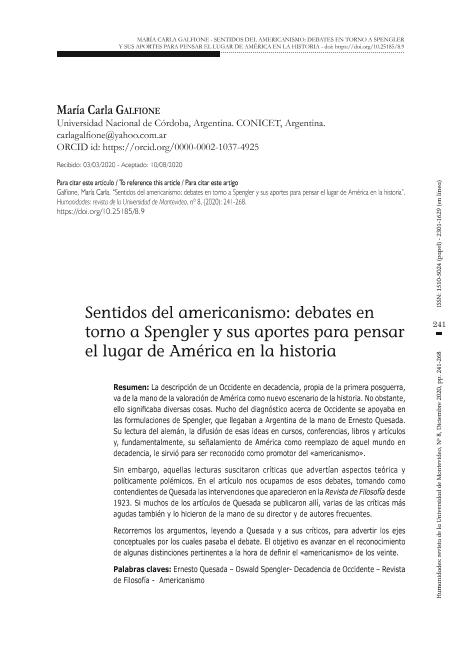Mostrar el registro sencillo del ítem
dc.contributor.author
Galfione, Maria Carla

dc.date.available
2021-10-25T16:04:15Z
dc.date.issued
2020-12
dc.identifier.citation
Galfione, Maria Carla; Sentidos del americanismo: debates en torno a Spengler y sus aportes para pensar el lugar de América en la historia; Universidad de Montevideo; Humanidades; 8; 12-2020; 241-268
dc.identifier.issn
2301-1629
dc.identifier.uri
http://hdl.handle.net/11336/144950
dc.description.abstract
La descripción de un Occidente en decadencia, propia de la primera posguerra, va de la mano de la valoración de América como nuevo escenario de la historia. No obstante, ello significaba diversas cosas. Mucho del diagnóstico acerca de Occidente se apoyaba en las formulaciones de Spengler, que llegaban a Argentina de la mano de Ernesto Quesada. Su lectura del alemán, la difusión de esas ideas en cursos, conferencias, libros y artículos y, fundamentalmente, su señalamiento de América como reemplazo de aquel mundo en decadencia, le sirvió para ser reconocido como promotor del «americanismo». Sin embargo, aquellas lecturas suscitaron críticas que advertían aspectos teórica y políticamente polémicos. En el artículo nos ocupamos de esos debates, tomando como contendientes de Quesada las intervenciones que aparecieron en la Revista de Filosofía desde 1923. Si muchos de los artículos de Quesada se publicaron allí, varias de las críticas más agudas también y lo hicieron de la mano de su director y de autores frecuentes. Recorremos los argumentos, leyendo a Quesada y a sus críticos, para advertir los ejes conceptuales por los cuales pasaba el debate. El objetivo es avanzar en el reconocimiento de algunas distinciones pertinentes a la hora de definir el «americanismo» de los veinte.
dc.description.abstract
The description of the West world in decline, typical of the first postwar period, is interpreted along with the perception of America as a new scenario in history. However, this means various things. Many of the diagnosis about the West world was based on Spengler’s paradigm, which arrived in Argentina through Ernesto Quesada. His reading of German, the dissemination of these ideas in courses, conferences, books and articles, and his signaling of America as a replacement for that world decline helped him to be recognized as a promoter of “Americanism”. However, those readings raised criticism on theoretically and politically controversial aspects. In the article we deal with these debates, reading the critics that appeared in the Revista de Filosofía since 1923. If many of Quesada’s articles were published there, several of the sharpest comments also appeared from the pen of its director and frequent authors. We go through the arguments, reading Quesada and his critics, to notice the conceptual axes through which the debate took place. The objective is to advance in the recognition of some pertinent distinctions when defining the “Americanism” of the 20th.
dc.format
application/pdf
dc.language.iso
spa
dc.publisher
Universidad de Montevideo
dc.rights
info:eu-repo/semantics/openAccess
dc.rights.uri
https://creativecommons.org/licenses/by-nc/2.5/ar/
dc.subject
ERNESTO QUESADA
dc.subject
OSWALD SPENGLER
dc.subject
AMERICANISMO
dc.subject
REVISTA DE FILOSOFÍA
dc.subject.classification
Filosofía, Historia y Filosofía de la Ciencia y la Tecnología

dc.subject.classification
Filosofía, Ética y Religión

dc.subject.classification
HUMANIDADES

dc.title
Sentidos del americanismo: debates en torno a Spengler y sus aportes para pensar el lugar de América en la historia
dc.title
Senses of Americanism: debates on Spengler and his contributions to think about America’s place in history
dc.title
Sentidos do americanismo: debates em torno de Spengler e suas contribuições para pensar sobre o lugar da América na história
dc.type
info:eu-repo/semantics/article
dc.type
info:ar-repo/semantics/artículo
dc.type
info:eu-repo/semantics/publishedVersion
dc.date.updated
2021-09-06T16:00:52Z
dc.identifier.eissn
1510-5024
dc.journal.number
8
dc.journal.pagination
241-268
dc.journal.pais
Uruguay

dc.journal.ciudad
Montevideo
dc.description.fil
Fil: Galfione, Maria Carla. Consejo Nacional de Investigaciones Científicas y Técnicas. Centro Científico Tecnológico Conicet - Córdoba. Instituto de Humanidades. Universidad Nacional de Córdoba. Instituto de Humanidades; Argentina
dc.journal.title
Humanidades
dc.relation.alternativeid
info:eu-repo/semantics/altIdentifier/url/http://revistas.um.edu.uy/index.php/revistahumanidades/article/view/709
dc.relation.alternativeid
info:eu-repo/semantics/altIdentifier/doi/http://dx.doi.org/10.25185/8.9
Archivos asociados
